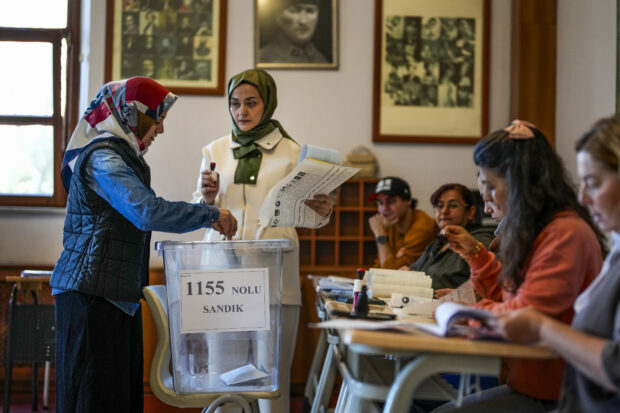
A woman votes at a polling station in Istanbul, Turkey, Sunday, March 31, 2024. Turkey is holding local elections on Sunday that will decide who gets to control Istanbul and other key cities. (AP Photo/Emrah Gurel)
Istanbul, Turkey — Turkey’s local elections on Sunday dealt the biggest blow in more than two decades to President Recep Tayyip Erdogan and his ruling AKP party.
Here are five things to know about the poll that turned into a debacle for the country’s veteran leader.
More than a local poll
By throwing all his energy into campaigning for his party’s candidates for mayors, Erdogan gave the election a national resonance and made it a de facto referendum on him and his party.
READ: In setback to Turkey’s Erdogan, opposition makes huge gains in local election
This held especially true in Istanbul, the country’s megapolis and economic powerhouse where Erdogan got his own political start and that he badly wanted to recapture from the opposition.
The voters’ answer was clear — the ruling party not only failed to wrest back control of Istanbul and the capital Ankara from the opposition, but lost ground in the country’s other major cities, including in the conservative Anatolia region, which had been considered an AKP stronghold.
“The biggest election defeat of Erdogan’s career”, is how Berk Esen, a political scientist at Sabanci University, described the election, in which the main opposition CHP party scored “its best result since 1977”.
Economic woes
The election took place against a sombre economic background — 67 percent inflation and massive devaluation of the lira, which has deeply affected the lives of most Turks.
“When Turkish people vote, the situation in the kitchen or on their plate changes the voting trend,” Ali Faik Demir, a political scientist at Galatasaray University, told AFP.
The biggest voting changes happen “when we cannot afford a living, when we cannot eat”.
Istanbul
“Whoever wins Istanbul, wins Turkey,” Erman Bakirci, a pollster from Konda Research and Consultancy, recalled Erdogan once saying.
The mythic city straddling Europe and Asia is Turkey’s economic powerhouse, accounting for 30 percent of the country’s gross domestic product (GDP). With 16 million residents, it has nearly a fifth of the national population.
“It’s not easy to run Istanbul, a city more populous than 20 countries in the European Union,” said Aylin Unver Noi, a professor at Istanbul’s Halic University. “It’s a hub, a commercial, financial and cultural centre. It’s a country”, she said, adding that “those who manage to run this city and prove themselves there” open the way to a national platform.
Erdogan has personified this — he grew up in Istanbul and became mayor in 1994, launching a career that propelled him to the country’s top posts.
Erdogan’s twilight?
Erdogan has been in power in Turkey since 2003, when he assumed the post of prime minister. He was elected president in 2014 and re-elected twice since, most recently in 2023.
During his time at the top, he had survived many storms, including huge opposition protests in 2013 that engulfed the vast majority of the country and a coup attempt in 2016.
Some analysts had already suggested that the loss of Istanbul and the capital Ankara to the opposition in last municipal polls in 2019 signalled a turning point in the fortunes of Erdogan and his party. The huge blow dealt this time around could prove fatal, some observers have said.
Even before Sunday’s poll, Erdogan had suggested that the 2023 election that saw him re-elected president with 52 percent of the vote would be his last.
Bayram Balci, a researcher at France’s Sciences Po university, says this possibility is now all but certain.
“He is capable of a surprise and of deciding to end his career,” he said. It would be “a way to go out in style, all the while remaining faithful to his vision of Islam and his religious beliefs, according to which nothing on this earth is permanent”.
President Imamoglu?
With another decisive victory against Erdogan’s ruling party, Istanbul Mayor Ekrem Imamoglu has cemented a leader’s role within Turkey’s notoriously fractious opposition.
He has the stature, the popularity, sense of media and above all, ambition.
During the run-up to Sunday’s vote, Erdogan pressed his message that Imamoglu — whose name he rarely mentioned — was a “part-time mayor” consumed by presidential ambitions.
The same charge has been levelled by his opponents within his own CHP party.
But since his first victory in 2019, he has faced legal troubles that could mar his political future.
An Istanbul court ruled in 2023 that an Imamoglu remark to reporters that city election officials were “idiots” was defamatory and sentenced him to nearly three years in jail.
It barred him from politics for the duration of the sentence.
Imamoglu has appealed, meaning that he has continued to serve as mayor while putting his fate in the hands of judges whose impartially he questioned.
It is not clear how the case against him will evolve ahead of the next presidential election in Turkey, which is set for 2028.

